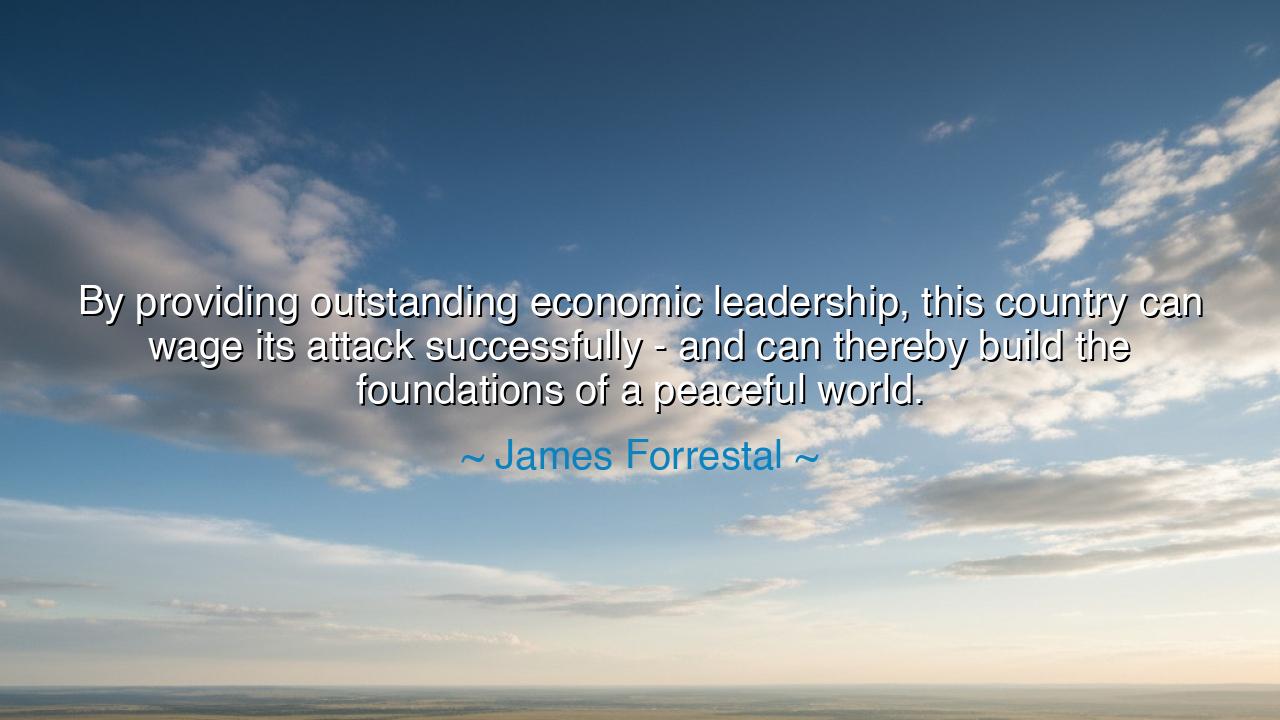
By providing outstanding economic leadership, this country can
By providing outstanding economic leadership, this country can wage its attack successfully - and can thereby build the foundations of a peaceful world.






Hear the solemn words of James Forrestal, the first Secretary of Defense of the United States, who declared in the shadow of war and the dawn of a new order: “By providing outstanding economic leadership, this country can wage its attack successfully—and can thereby build the foundations of a peaceful world.” These words are not mere counsel on commerce, but a vision of how wealth, wisely guided, becomes the bedrock of both strength and peace. He spoke in an age scarred by global conflict, when nations had learned that armies march not only on courage, but also on bread, steel, and the lifeblood of the economy.
Forrestal’s insight was born in the crucible of the Second World War. America, with its vast factories and fertile lands, became the arsenal of democracy. Ships, planes, and supplies flowed across the oceans, sustaining allies and overwhelming foes. This was economic leadership in its most heroic form: not wealth for its own sake, but wealth turned into a shield and a sword. Forrestal saw that victory did not rest on battles alone, but on the ability to organize resources, harness industry, and provide for both soldier and civilian.
History confirms this eternal law. Consider ancient Athens, whose silver mines at Laurium funded the fleet that defeated Persia at Salamis, securing the survival of Greek liberty. Or think of Rome, whose roads and granaries allowed legions to be fed and supplied across continents. In every age, economic strength has undergirded military power, and through victory, has opened the path to stability. Forrestal’s words echo this truth, declaring that prosperity rightly used is the soil in which peace may be planted.
Yet his wisdom does not glorify war, but rather points beyond it. For he speaks of building “the foundations of a peaceful world.” Economic leadership is not only about conquest, but about what comes after—the weaving of trade, the rebuilding of nations, the lifting of the poor, the prevention of future strife. Just as the Marshall Plan rebuilt Europe after devastation, so too does true economic leadership heal wounds and knit enemies into partners. Forrestal’s vision was one of turning resources not merely into weapons, but into bridges.
But his words also carry warning. Where there is no economic leadership, there is weakness; where wealth is squandered, nations crumble. History is filled with empires undone not by defeat in battle, but by corruption, mismanagement, and decay within. The wealth of Spain’s empire drained into debt; the might of Rome was exhausted by extravagance. Forrestal urges us to remember: strength without stewardship is fleeting, but prosperity wisely guided is enduring.
The lesson for us, O listener, is both personal and collective. In your own life, practice wise stewardship of your resources. Let your labor and wealth serve not only yourself, but the greater good. And as citizens, demand of your leaders not only military power, but also economic leadership that sustains justice, supports the vulnerable, and builds bonds of cooperation with other nations. For in such stewardship lies the hope of a world where peace is not the pause between wars, but the fruit of lasting prosperity.
Thus let James Forrestal’s words endure across the ages: a nation that wields its economy with wisdom and concern for the common good can both prevail against threats and lay the stones of a peaceful world. Let us remember that true leadership is not measured only in arms or victories, but in the lasting abundance and harmony it leaves behind. For it is not war alone that shapes destiny, but the wise use of wealth to build peace.






AAdministratorAdministrator
Welcome, honored guests. Please leave a comment, we will respond soon